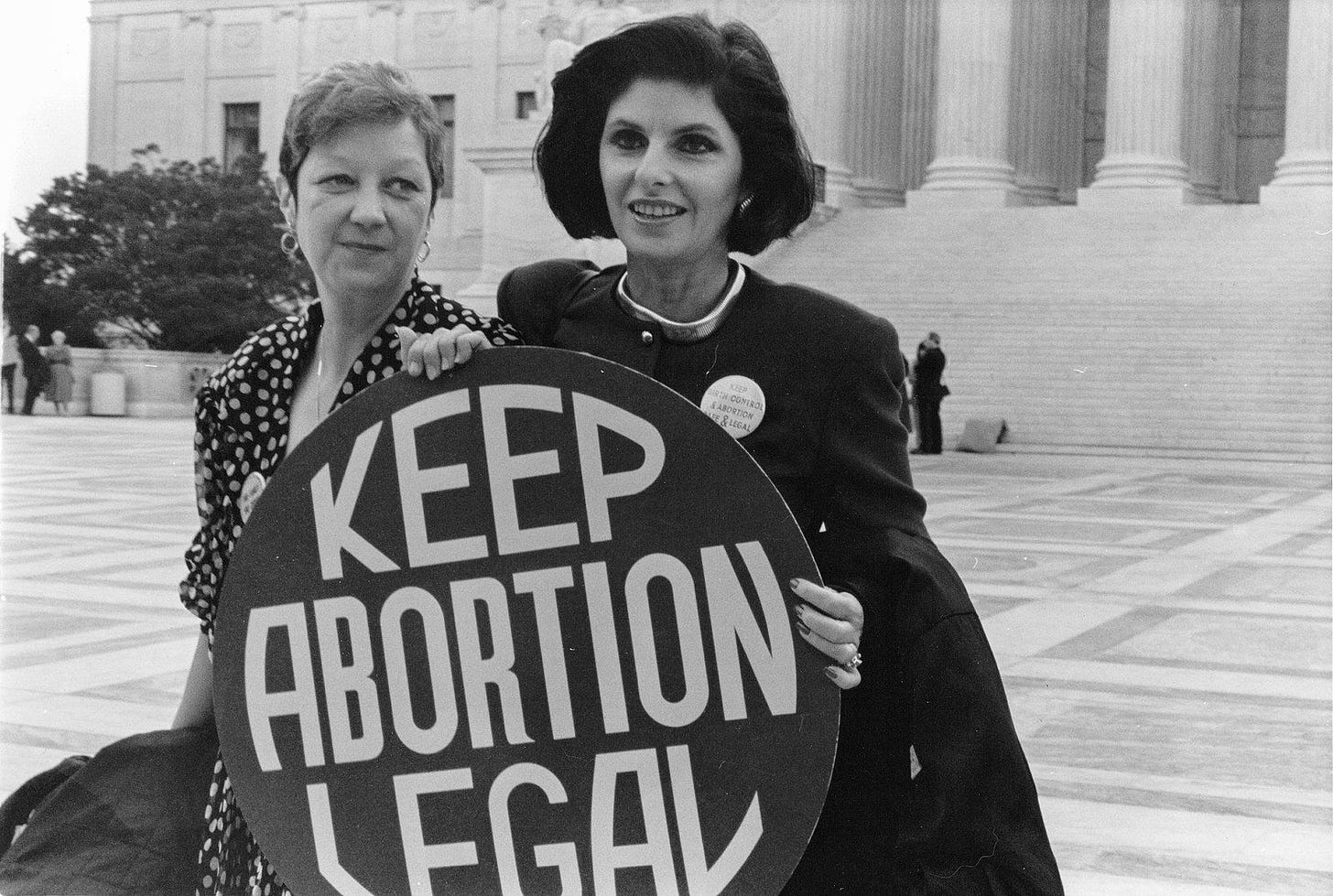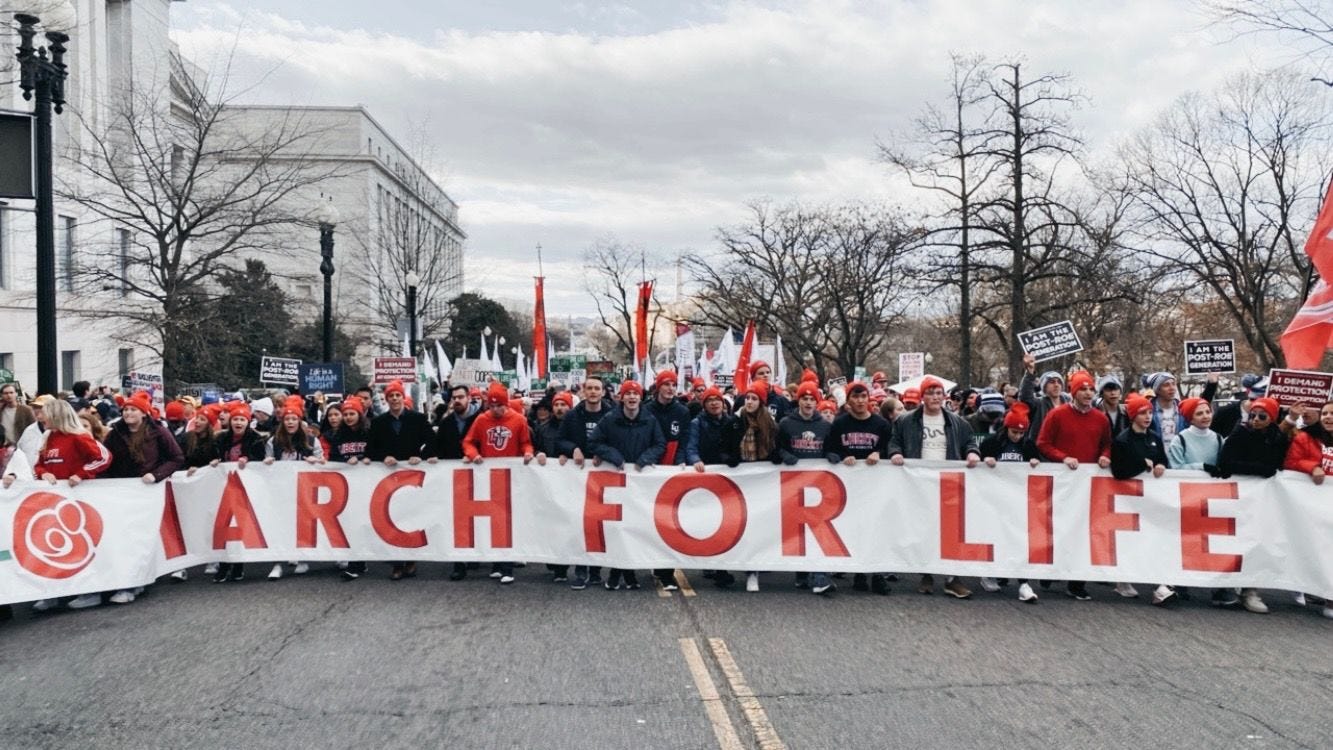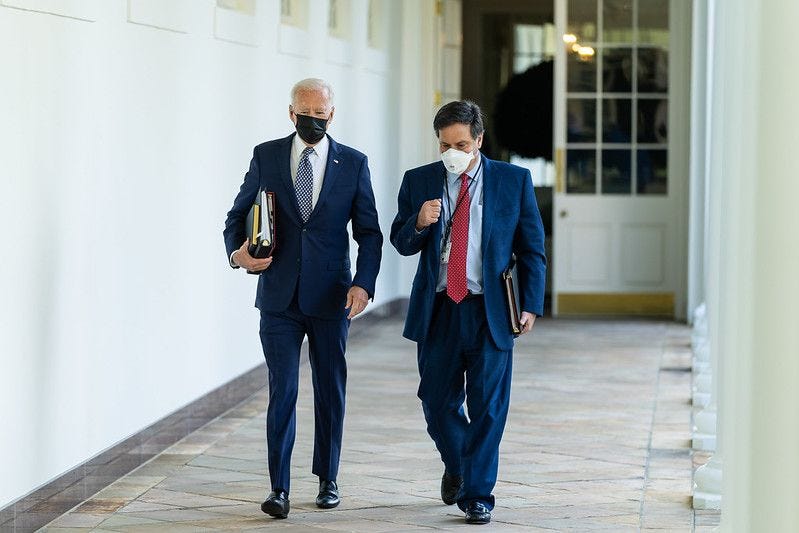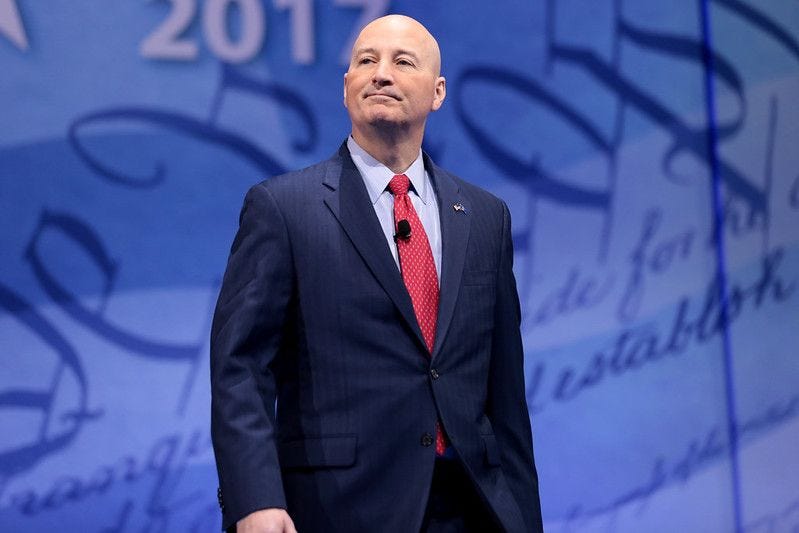Roe v. Wade, 50 years later
Where the fight over abortion rights stands across the country as Roe v. Wade marks a half-century.
📣 If this newsletter was forwarded to you, subscribe here. If you want to contribute to support my work, donate here.
Dueling demonstrations descended on Washington this weekend as the March for Life and the Women’s March held back-to-back rallies to celebrate and protest, respectively, the end of Roe v. Wade.
Sunday was the 50th anniversary of the Supreme Court’s opinion in Roe, the landmark decision which protected abortion rights in the U.S. until the court’s new conservative supermajority reversed it with Dobbs v. Jackson Women’s Health Organization last June.
Here’s the latest on abortion rights at each level of government, 50 years after Roe and seven months after Dobbs:
In the states
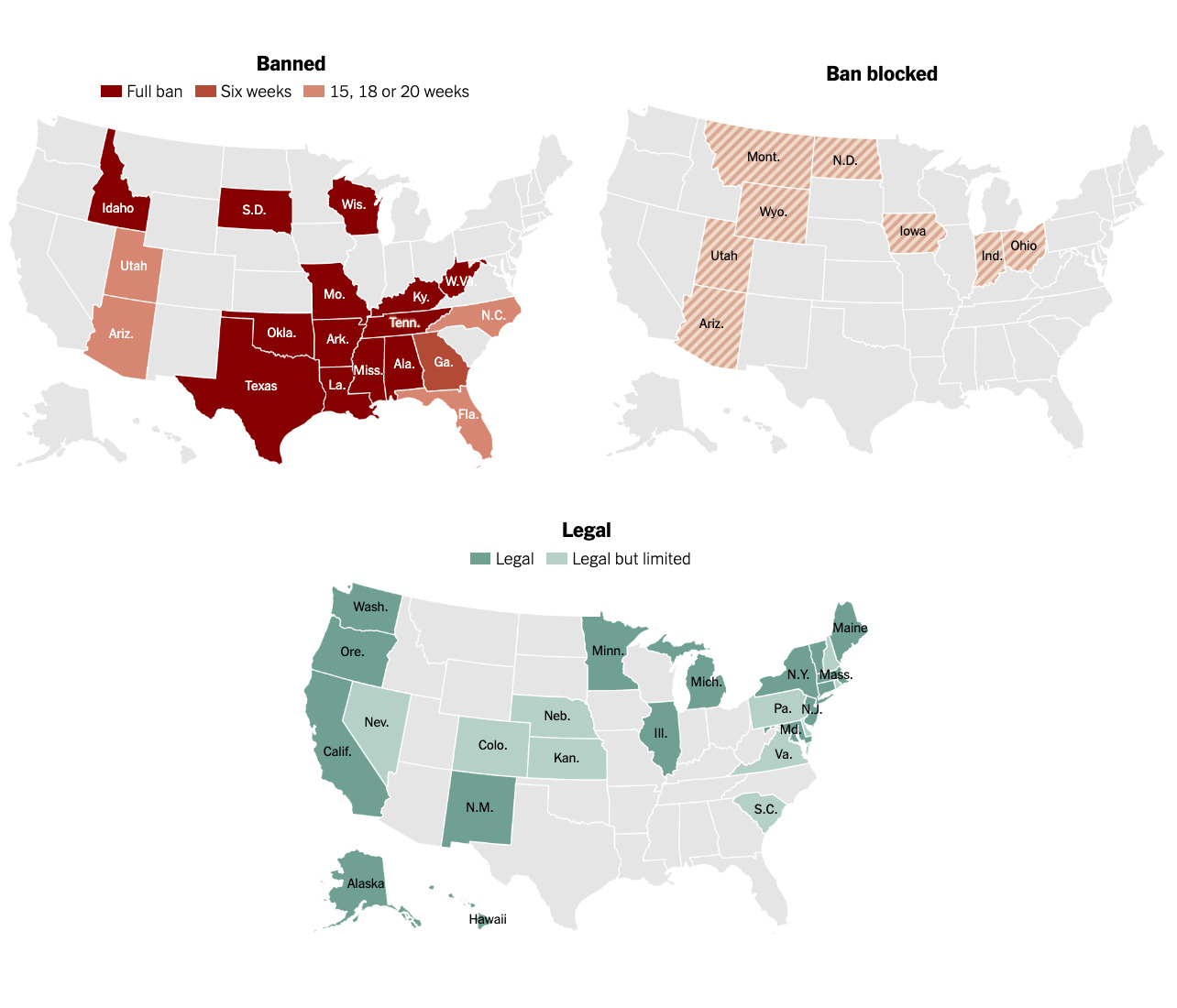
After Dobbs left it up to the states to set abortion policy within their borders, the most important fights on the issue are no longer playing out in Washington but in the 50 state capitals.
In the months since, according to the New York Times, 13 states have implemented full abortion bans. Five have enacted abortion bans with gestational limits of either six, 15, 18, or 20 weeks. (Roe prohibited states from banning abortion before a fetus was able to survive outside the womb, a point know as viability that is typically reached at around 24 weeks gestation.)
Eight more states have passed abortion bans that are currently not in effect, having been blocked by the courts. Abortion is legal at least up until 22 weeks gestation in the remaining 24 states, creating an almost perfectly divided nation. Some news outlets have referred to states with laws or court decisions protecting abortion as having “mini Roes” on the books.
Most recently, the South Carolina Supreme Court struck down the state’s six-week abortion ban earlier this month, making it the lone state in the Deep South where abortion is now protected up until the 22-week mark.
In many states, the most potent abortion battles currently raging are between Republicans, as the party experiences a reckoning over whether statewide abortion bans should include exceptions for rape, incest, and life of the mother. Per Politico, GOP lawmakers in Idaho, Missouri, North Dakota, Utah, and Wisconsin “have introduced or may soon introduce bills that revisit who is exempt from their state’s near-total abortion bans — some of which date to the 19th century.”
It is an intraparty dispute that has been raging since backlash to Dobbs contributed to Democratic gains in many states last November. Former President Donald Trump wrote last month on Truth Social that “the abortion issue” cost Republicans votes in the midterms, specifically blaming GOP leaders who “firmly insisted on no exceptions, even in the case of rape, incest, or life of the mother.”
Congress
To the extent abortion remains a live issue in Washington, attention has moved from the Supreme Court to the halls of Congress. The most glaring symbol of this new reality came on Friday, when the March for Life switched its decades-long route to end at the Capitol instead of the Court building.
But the outlook for abortion legislation from either side is dim in the divided Congress. It remains unclear if the Republican-led House will vote on any sort of national abortion ban, which would be doomed to fail in the Senate.
In their first days in the House majority, the GOP did pass two pieces of abortion-related legislation, including a bill requiring that infants “born alive” after an attempted abortion, a rare occurrence, be given the same medical rights and protections as any newborn. The measure, which received one Democratic vote, would set a penalty of up to five years in prison for physicians who fail to comply.
The House also passed a resolution condemning recent attacks on pro-life facilities and churches, which received three Democratic votes.
White House
President Biden would often promise on the 2022 campaign trail that he would mark the 50th anniversary of Roe by signing a bill into law codifying the former Supreme Court precedent. Of course, with his party now in the House minority and lacking enough seats to nullify the Senate filibuster, that campaign promise is not destined to come to fruition.
Biden is instead left with executive actions as his only meaningful way to act on abortion. In his latest act since Dobbs was handed down, Biden signed a presidential memorandum on Sunday directing the Secretary of Health and Human Services to consider new regulations protecting access to mifepristone, a medication which can end a pregnancy when used with another pill.
The FDA moved earlier this month to allow drug stores to carry mifepristone, leading Walgreens and CVS to begin selling the pill. White House Gender Policy Council director Jennifer Klein told The Atlantic that the Biden administration views access to mifepristone as “the next battlefront” in the abortion fight; many states are likely to pass laws either legalizing or banning the medication in the months ahead.
Meanwhile, Vice President Kamala Harris has emerged as Biden’s main messenger on abortion. Biden did not speak on the Roe anniversary, but Harris did, delivering a fiery speech in Tallahassee, Florida, the capital of one of the red states with a new abortion ban.
“How dare they?” Harris repeatedly asked, referring to GOP leaders in Florida and elsewhere who have put abortion bans in place.
Supreme Court
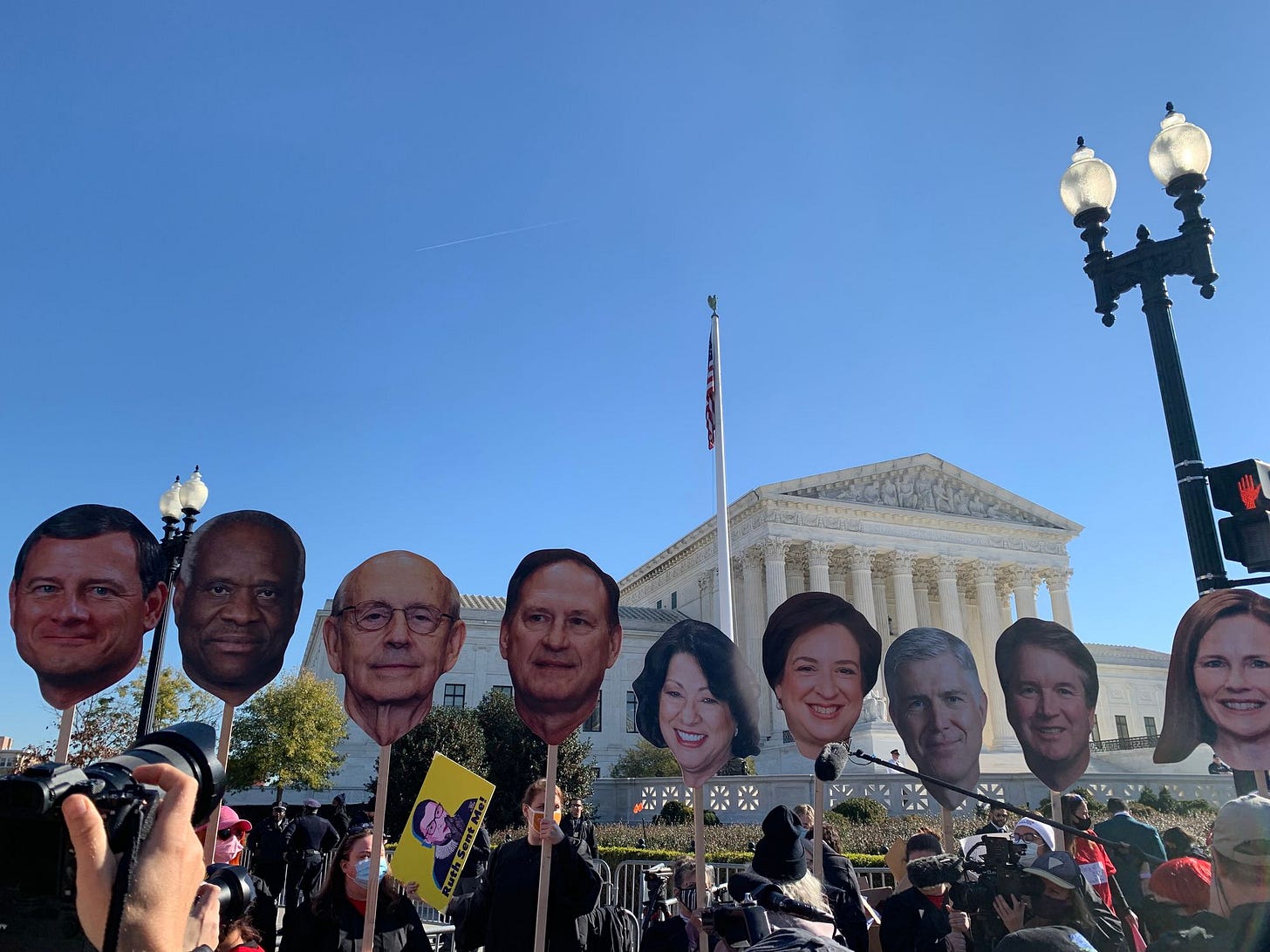
Finally, the home of both the Roe and Dobbs decisions. No abortion cases are on the Supreme Court docket this year, at least not yet, but the reverberations of last term’s Dobbs continue to shake the court.
After decades in which justices of all stripes took pains to laud the court’s collegiality, a clear shift in tone is noticeable in their recent public speeches, as the liberal justices grow more vocal in raising doubts about the court’s legitimacy and the conservative majority pushes back on such fears.
Court watchers have especially noted the apparent disillusionment of Justice Elena Kagan, an Obama appointee once known for her relationships with Republican appointees who has spoken publicly about the impact of Dobbs on the court’s reputation.
Trust at the court has also ebbed to a low after the first draft of Justice Samuel Alito’s majority opinion in Dobbs was leaked before its release. An investigative team appointed to probe the leak announced last week that they have so far failed to identify the person responsible.
The court later issued an additional statement clarifying that all nine of the justices were interviewed as part of the probe, although none signed sworn affidavits, like the clerks and other employees who were interviewed.
More news you should know.
White House chief of staff Ron Klain is expected to step down next month. He will be replaced by Jeff Zients, who led the White House coronavirus response, at the outset of the Biden administration. Klain, a decades-long Biden adviser, was one of the most powerful chiefs of staff in modern presidential history; some lawmakers even took to calling him “prime minister.”
Zients served in several senior roles in the Obama administration, developing a reputation as a “fixer” for quagmires such as the Healthcare.gov fiasco. He also has an estimated net worth above $100 million, from a business career that has gained him blowback from progressives.
The FBI found more classified documents at President Biden’s Delaware home during a search on Friday. The exact number of additional documents was unclear, although Biden’s personal lawyer said that the agents seized “six items consisting of documents with classified markings.” The new tranche included materials from Biden’s time as vice president and some stretching as far back as his tenure in the Senate.
The search, which took nearly 13 hours and was disclosed the next day, was requested by the Biden team. The Justice Department is now reportedly considering similar examinations of Biden’s other homes and offices, where at least 20 other classified documents have been found by the president’s legal team.
Rep. Ruben Gallego (D-AZ) announced a 2024 Senate run this morning. Gallego, a progressive lawmaker and military veteran, will be seeking the seat currently held by Sen. Kyrsten Sinema (I-AZ). Sinema left the Democratic Party late last year and has yet to announce if she will run for re-election.
If Sinema does seek another term, Gallego’s entrance into the race sets up a three-way contest between them and a Republican nominee. Possible GOP candidates for the seat include Kari Lake and Blake Masters, who ran unsuccessfully for governor and for Senate, respectively, in 2022.
More migrants were caught in December attempting to illegally cross the U.S.-Mexico border than in any other month of the Biden administration. According to Customs and Border Protection (CBP), U.S. authorities stopped migrants at the border 251,487 times in December, a 7% increase from the month before and a 40% increase from December 2021.
The uptick came largely from a surge in Cuban and Nicaraguan arrivals. The official number only includes migrants who were stopped: CBP sources told Fox News that since Biden took office, about 1.2 million migrants have illegally crossed the border and evaded apprehension.
Ten people were killed in a mass shooting at a Lunar New Year celebration in Monterey Park, California on Saturday night. The suspect, a 72-year-old Asian man, was found dead of a self-inflicted gunshot wound on Sunday. The motive for the attack remains unclear.
The shooting was the deadliest to take place in the U.S. since 21 students and teachers were killed in Uvalde, Texas last May.
Plus, some recommended reads:
“Karen Bass and Kevin McCarthy are old political pals. Does that mean anything anymore?” LAT
“Nancy Pelosi, Liberated and Loving It” NYT
“Senate workhorses face political extinction, which could leave big holes” WaPo
What your leaders are doing today.
White House
President Biden will return to Washington this morning from Rehoboth Beach, Delaware, where he spent the weekend. He has nothing else on his public schedule.
Vice President Harris will administer the oath of office to Pete Ricketts, the former Nebraska governor who has been appointed to fill the seat being vacated by Sen. Ben Sasse (R-NE). Sasse resigned to become president of the University of Florida. Watch the swearing-in at 3 p.m. ET
White House press secretary Karine Jean-Pierre will hold her daily press briefing. Watch at 2 p.m. ET
Congress
The Senate is scheduled to hold one vote today, on Brendan Owens’ nomination to be Assistant Secretary of Defense for Energy, Installations, and Environment. Watch today’s session at 3 p.m. ET
The House will not meet today.
Courts
The Supreme Court is expected to release its first opinions of the term, which began in October. The justices have never gone this long into a term without deciding at least one case. Read the opinions when they’re posted at 10 a.m. ET
Before I go...
Here’s something interesting: A group of researchers at Harvard have spent 85 years studying health and happiness, starting with an original group of 724 men and now expanding to more than 1,300 of their male and female descendants over three generations.
According to the study — the “longest in-depth longitudinal study on human life ever done” — fostering and maintaining strong personal relationships is the single most important factor in bringing about long-term health and happiness. Here it is from Robert Waldinger and Marc Schulz, the study’s directors:
“Through all the years of studying these lives, one crucial factor stands out for the consistency and power of its ties to physical health, mental health and longevity. Contrary to what many people might think, it’s not career achievement, or exercise, or a healthy diet. Don’t get us wrong; these things matter. But one thing continuously demonstrates its broad and enduring importance: good relationships.”
Read recent essays from Waldinger and Schulz in The Atlantic and The Wall Street Journal. They also have a new book out, available here.
Thanks for reading.
I get up each morning to write Wake Up To Politics because I’m committed to offering an independent and reliable news source that helps you navigate our political system and understand what’s going on in government.
The newsletter is completely free and ad-free — but if you appreciate the work that goes into it, here’s how you can help:
Donate to support my work or set up a recurring donation (akin to a regular subscription to another news outlet).
Buy some WUTP merchandise to show off your support (and score a cool mug or hoodie in the process!)
Tell your family, friends, and colleagues to sign up at wakeuptopolitics.com. Every forward helps!
If you have any questions or feedback, feel free to email me: my inbox is always open.
Thanks so much for waking up to politics! Have a great day.
— Gabe



